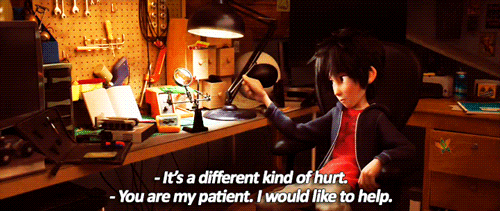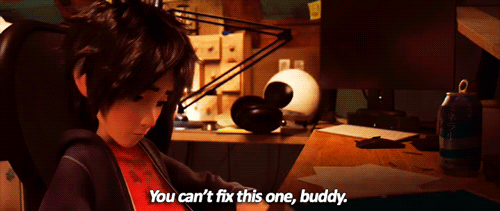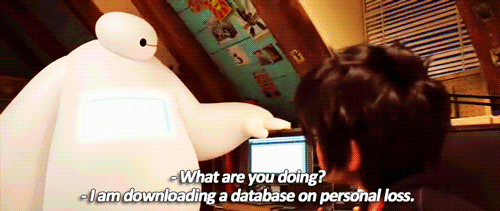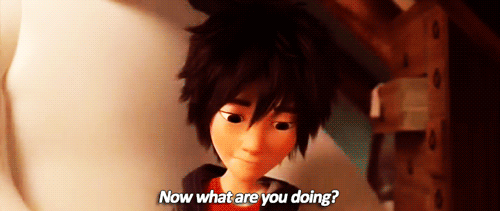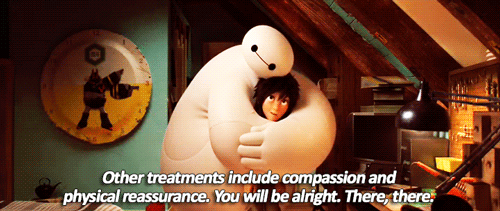Photo

Hate will not win. Our KAL cartoon in January, after Charlie Hebdo
314 notes
·
View notes
Photo


"Flavorful tast in the enjoyment" is right!
3 notes
·
View notes
Quote
When people of colour are expected to educate white people as to their humanity, when women are expected to educate men, lesbians and gay men are expected to educate the heterosexual world, the oppressors maintain their position and evade their responsibility for their own actions.
- Audre Lorde (via obliteratedheart)
38K notes
·
View notes
Photo
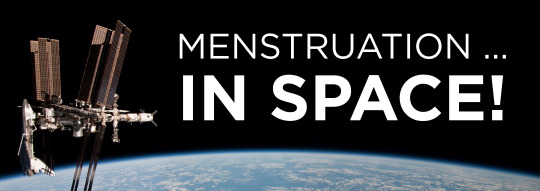
Hundreds of you sent in questions for my live conversation with three astronauts and NASA’s chief scientist on Tuesday. Thanks! The most common question was: “What happens when you get your period in space?”
I didn’t end up asking this question because
a) the question itself has a lot of historical baggage b) the answer is pretty boring
But because people seemed genuinely curious, I decided to answer it here.
First, a bit of history…
In the early days of space flight, menstruation was part of the argument that women shouldn’t become astronauts.
Some claimed (1) that menstruation would effect a woman’s ability, and blamed several plane crashes on menstruating women. Studies in the 1940s (2,3) showed this was not the case. Female pilots weren’t impaired by their periods. But the idea wouldn’t die. In 1964, researchers from the Women in Space Program (4) still suggested (without evidence) that putting “a temperamental psychophysiologic human” (i.e. a hormonal woman) together with a “complicated machine” was a bad idea.
Others raised concerns about hypothetical health risks. They feared that microgravity might increase the incidence of “retrograde menstruation.” Blood might flow up the fallopian tubes into the abdomen, causing pain and other health problems. No one actually did any experiments to see if this really would be a problem, so there wasn’t any data to support or refute these fears.
Advocates for women in space argued that there had been a lot of unknowns when humans first went to space, but they sent men up anyway. Rhea Seddon, one of the first six women astronauts at NASA, recalled during an interview:
We said, “How about we just consider it a non-problem until it becomes a problem? If anybody gets sick in space you can bring us home. Then we’ll deal with it as a problem, but let’s consider it a non-problem.”
Just to give you a sense of the culture surrounding female astronauts back then, here’s an excerpt of a 1971 NASA report about potential psychological problems in space. Researchers Nick Kanas and William Fedderson suggest there might be a place for women in space:
The question of direct sexual release on a long-duration space mission must be considered. Practical considerations (such as weight and expense) preclude men taking their wives on the first space flights. It is possible that a woman, qualified from a scientific viewpoint, might be persuaded to donate her time and energies for the sake of improving crew morale; however, such a situation might create interpersonal tensions far more dynamic than the sexual tensions it would release.
Kanas, now an emeritus professor of psychology at UCSF, told me this was tongue-in-cheek — part of a larger discussion about the problem of sexual desire in space (5). Still, it’s surprising this language was included in an official NASA memorandum. Even advocates for women in space were caught up in this kind of talk. In a 1975 report for the RAND corporation, Glenda Callanen argues that women have the strength and intelligence to become astronauts. But here’s how she begins the report’s conclusion:
It seems inevitable that women are to be essential participants in space flight. Even if they were only to take on the less scientific parts of the space mission, or if they wished only to help “colonize” distant planets, their basic skills must still prepare them to perform countless new tasks.
In a culture where these statements were unremarkable, it’s easy to imagine that questions about menstruation weren’t purely motivated by scientific curiosity.
In 1983, 22 years after Alan Shepard became the first American to go to space, Sally Ride left earth’s atmosphere. She told an interviewer:
I remember the engineers trying to decide how many tampons should fly on a one-week flight; they asked, “Is 100 the right number?” “No. That would not be the right number.”
So what DOES happen when you get your period in space?
The same thing that happens on Earth! In the last three decades years of female space flight, periods in space have been normal — no menstrual problems in microgravity.
Notes:
RE Whitehead, MD. “Notes from the Department of Commerce: Women Pilots.” The Journal of Aviation Medicine 5 (Mar-Dec 1934):48.
RS Holtz, MD. “Should Women Fly During the Menstrual Period?” The Journal of Aviation Medicine 12 (Sept 1941):302.
J Cochrane. “Final Report on Women Pilot Program.” 38.
JR Betson and RR Secrest. “Prospective women astronauts selection program.” American Journal of Obstetrics and Gynecology 88 (1964): 421–423.
Kanas and Fedderson’s 1971 report went on to conclude: “Information regarding women during periods of stress is scanty. This lack, plus previously mentioned problems, will make it difficult for a woman to be a member of the first long-duration space missions. However, it is just as unlikely to think that women cannot adapt to space. Initial exploration parties are historically composed of men, for various cultural and social reasons. Once space exploration by men has been successfully accomplished, then women will follow. In preparation for this, more information should be compiled regarding the physiology and psychology of women under stressful situations.”
5K notes
·
View notes
Link
Trevor Noah is the latest on the rack for blundering comments. But it’s how we deal with our flaws that really matters.
This is a must read.
163 notes
·
View notes
Video
youtube
#tbt: World Spins Madly On by The Weepies
The Weepies’ “World Spins Madly On” will have you weeping. This folk-rock duo—consisting of Deb Talan and Steve Tannen—relies on their velvet-soft voices and acoustic talents to sway your emotions. Before joining, the solo singers were fans of each other; after meeting, they quickly bonded and began making music together, playing to each other’s strengths and adding more depth to their songs. Talan and Tannen treat music like a dance as they entangle their respective vocals and layer their strings, creating intricate but subtle sounds of beauty. If you want a good cry, either for joy or for sorrow, it’s these two you need to sit down and listen to.
75 notes
·
View notes
Note
What?! Wow!
I have a real job, I work fucking hard every day, I dont sit infront of a computer with my tits out. I would LOVE a mac book, right, I wouldn't expect anyone to DONATE money to me to get one. You're a fucking joke. I'm sure your army of idiots will jump to your defence, but you really need to go out and get a real job, you waste of space.
Hey I hope your day gets better and whatever it is your angry about gets resolved. I understand wanting to take your frustration out on someone else and I can see how I’m an easy target. I hope no one every speaks this way to you or anyone you love. Things will get better. I’m rooting for you. :)
331 notes
·
View notes
Text
Fun vaccination fact:
It’s not unusual for large, older cemeteries to have a special “babyland" section dedicated just to infants and young children.
If you spend any time doing historical research involving cemeteries, you’ll notice that child graves were quite common until about the 1960s, when vaccines for Measles, Polio, Mumps, and Rubella were invented.
24K notes
·
View notes
Photo

We think the data speaks for itself. Ferguson is not over.
Ferguson Racial Profiling.
983 notes
·
View notes
Photo
:D

“I’m bored” is a useless thing to say. I mean, you live in a great, big, vast world that you’ve seen none percent of. Even the inside of your own mind is endless, it goes on forever, inwardly, do you understand? The fact that you’re alive is amazing, so you don’t get to say “I’m bored.”
- Louis C.K. By Daniel Jamie Williams - Click for my Tumblr!
2K notes
·
View notes
Photo

Today in Computer Scientists You Haven’t Heard Of: Margaret Hamilton
This is Margaret Hamilton, standing next to one of her earlier projects: The Apollo Guidance Computer’s main operating program.
I’m going to let that sink in for a moment. Look at your image of NASA in the Apollo days. Look at miss Hamilton.
Now, I’m sure you’ve heard the story about how the computer crashed on Neil and Mike on their descent, leaving Neil to make the landing by hand. This story has only the barest grounding in reality.
During the descent, a checklist error left the rendezvous radar - normally used for keeping track of the Command Module in orbit - turned on. Radar is a computationally hungry beast, and the computer unhappily told Neil and Mike that it was being overtasked. It kept right on going, even though it was being overworked. It kept the truly important numbers - altitude, descent rate, fuel consumption - up to date perfectly as they descended, which allowed Neil to fly safely above the lunar surface to find a landing site.
So, here you have a computer, easily the most powerful computer for its size ever made as of 1969, controlling a flying machine above the lunar surface, and correctly juggling multiple real-time processing tasks by priority. This is something that modern computers, fifty years later, still struggle with. Margaret built it and got it right at the very dawn of the multi-tasking operating system. It was something done by Serious Computers - fridge-sized monsters with names like PDP-8 and System/360… and a series of tiny boxes that flew to the moon and back.
And then she went on and did other things. Ever heard the term “Software Engineering”? Margaret’s invention. More technically speaking, she’s responsible for parallel and asynchronous computing (which now is key to every supercomputer and major website), priority scheduling, end-to-end testing, and a huge chunk of human-computer interface theory.
She’s still active in software engineering today.
38K notes
·
View notes
Photo

untitled by Pauline Franque on Flickr.
ce mouvement de la robe est incroyable
0 notes
Quote
So anyway, I was having this argument with my father about Martin Luther King and how his message was too conservative compared to Malcolm X’s message. My father got really angry at me. It wasn’t that he disliked Malcolm X, but his point was that Malcolm X hadn’t accomplished anything as Dr. King had. I was kind of sarcastic and asked something like, so what did Martin Luther King accomplish other than giving his “I have a dream speech.” Before I tell you what my father told me, I want to digress. Because at this point in our amnesiac national existence, my question pretty much reflects the national civic religion view of what Dr. King accomplished. He gave this great speech. Or some people say, “he marched.” I was so angry at Mrs. Clinton during the primaries when she said that Dr. King marched, but it was LBJ who delivered the Civil Rights Act. At this point, I would like to remind everyone exactly what Martin Luther King did, and it wasn’t that he “marched” or gave a great speech. My father told me with a sort of cold fury, “Dr. King ended the terror of living in the south.” Please let this sink in and and take my word and the word of my late father on this. If you are a white person who has always lived in the U.S. and never under a brutal dictatorship, you probably don’t know what my father was talking about. But this is what the great Dr. Martin Luther King accomplished. Not that he marched, nor that he gave speeches. He ended the terror of living as a black person, especially in the south. I’m guessing that most of you, especially those having come fresh from seeing The Help, may not understand what this was all about. But living in the south (and in parts of the midwest and in many ghettos of the north) was living under terrorism. It wasn’t that black people had to use a separate drinking fountain or couldn’t sit at lunch counters, or had to sit in the back of the bus. You really must disabuse yourself of this idea. Lunch counters and buses were crucial symbolic planes of struggle that the civil rights movement used to dramatize the issue, but the main suffering in the south did not come from our inability to drink from the same fountain, ride in the front of the bus or eat lunch at Woolworth’s. It was that white people, mostly white men, occasionally went berserk, and grabbed random black people, usually men, and lynched them. You all know about lynching. But you may forget or not know that white people also randomly beat black people, and the black people could not fight back, for fear of even worse punishment. This constant low level dread of atavistic violence is what kept the system running. It made life miserable, stressful and terrifying for black people. White people also occasionally tried black people, especially black men, for crimes for which they could not conceivably be guilty. With the willing participation of white women, they often accused black men of “assault,” which could be anything from rape to not taking off one’s hat, to “reckless eyeballing.” This is going to sound awful and perhaps a stain on my late father’s memory, but when I was little, before the civil rights movement, my father taught me many, many humiliating practices in order to prevent the random, terroristic, berserk behavior of white people. The one I remember most is that when walking down the street in New York City side by side, hand in hand with my hero-father, if a white woman approached on the same sidewalk, I was to take off my hat and walk behind my father, because he had been taught in the south that black males for some reason were supposed to walk single file in the presence of any white lady. This was just one of many humiliating practices we were taught to prevent white people from going berserk. I remember a huge family reunion one August with my aunts and uncles and cousins gathered around my grandparents’ vast breakfast table laden with food from the farm, and the state troopers drove up to the house with a car full of rifles and shotguns, and everyone went kind of weirdly blank. They put on the masks that black people used back then to not provoke white berserkness. My strong, valiant, self-educated, articulate uncles, whom I adored, became shuffling, Step-N-Fetchits to avoid provoking the white men. Fortunately the troopers were only looking for an escaped convict. Afterward, the women, my aunts, were furious at the humiliating performance of the men, and said so, something that even a child could understand. This is the climate of fear that Dr. King ended. If you didn’t get taught such things, let alone experience them, I caution you against invoking the memory of Dr. King as though he belongs exclusively to you and not primarily to African Americans. The question is, how did Dr. King do this—and of course, he didn’t do it alone. (Of all the other civil rights leaders who helped Dr. King end this reign of terror, I think the most under appreciated is James Farmer, who founded the Congress of Racial Equality and was a leader of nonviolent resistance, and taught the practices of nonviolent resistance.) So what did they do? They told us: Whatever you are most afraid of doing vis-a-vis white people, go do it. Go ahead down to city hall and try to register to vote, even if they say no, even if they take your name down. Go ahead sit at that lunch counter. Sue the local school board. All things that most black people would have said back then, without exaggeration, were stark raving insane and would get you killed. If we do it all together, we’ll be okay. They made black people experience the worst of the worst, collectively, that white people could dish out, and discover that it wasn’t that bad. They taught black people how to take a beating—from the southern cops, from police dogs, from fire department hoses. They actually coached young people how to crouch, cover their heads with their arms and take the beating. They taught people how to go to jail, which terrified most decent people. And you know what? The worst of the worst, wasn’t that bad. Once people had been beaten, had dogs sicced on them, had fire hoses sprayed on them, and been thrown in jail, you know what happened? These magnificent young black people began singing freedom songs in jail. That, my friends, is what ended the terrorism of the south. Confronting your worst fears, living through it, and breaking out in a deep throated freedom song. The jailers knew they had lost when they beat the crap out of these young Negroes and the jailed, beaten young people began to sing joyously, first in one town then in another. This is what the writer, James Baldwin, captured like no other writer of the era. Please let this sink in. It wasn’t marches or speeches. It was taking a severe beating, surviving and realizing that our fears were mostly illusory and that we were free.
Daily Kos :: Most of you have no idea what Martin Luther King actually did
Reblogging this so I can come back to it in the spring when I teach the Civil Rights Movement to my 5th graders.
(via copperoranges)
Reblogging this for all the non-black people who like to quote MLK like he’s theirs.
(via heathenist)
I think I’ve reblogged this before, but I’m doing it again. Even growing up on the South Side of Chicago, going through a public school in which most of the students were black, and in which Martin Luther King was a celebrated hero who got his own honors and assemblies every year, even then I was never taught this.
(via pentag0nal)
Politicalprof: a must read.
(via politicalprof)
A must read, indeed.
(via pol102)
'"Dr. King ended the terror of living in the south.” Please let this sink in...'
69K notes
·
View notes







